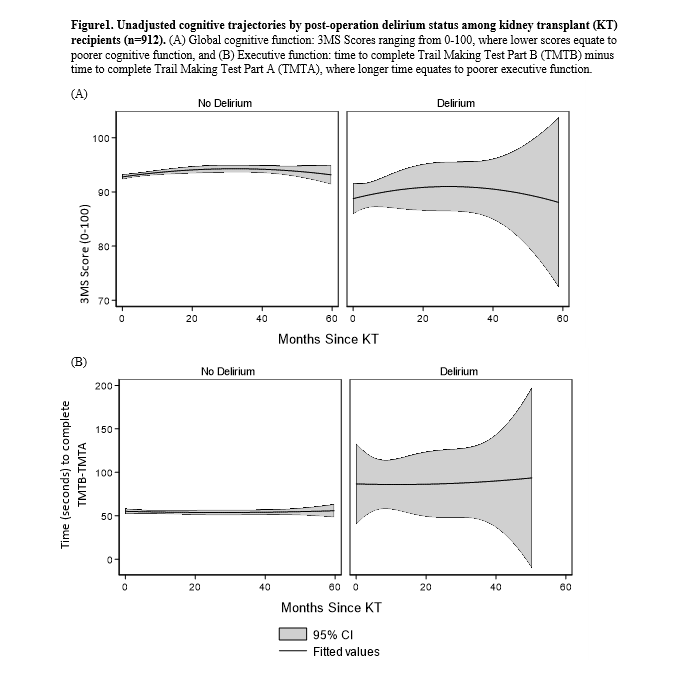Post-Operative Delirium and Cognitive Decline in Kidney Transplant Recipients
N. Chu, D. Segev, M. McAdams Demarco
Johns Hopkins, Baltimore, MD
Meeting: 2020 American Transplant Congress
Abstract number: 553
Keywords: Kidney transplantation, Post-operative complications
Session Information
Session Time: 3:15pm-4:45pm
 Presentation Time: 4:27pm-4:39pm
Presentation Time: 4:27pm-4:39pm
Location: Virtual
*Purpose: Post-operative delirium may be a marker for greater cognitive vulnerability to stressors. As a result, those with post-operative delirium may experience steeper decline in cognitive performance following stressors of surgery post-KT.
*Methods: We used a single center cohort study of 912 adult KT recipients with delirium assessments abstracted from medical records and global (3MS) and domain-specific (executive function: time to complete TMT-B minus TMT-A) cognitive performance measured at time of KT, 1-month, 3-months, 6-months, 1-year, and annually thereafter post-KT. We used mixed effects models with fixed and random effects for person and time to describe repeated measures of cognitive performance and compare trajectories by post-operative delirium.
*Results: Among 912 KT recipients, 44 (4.8%) had post-operative delirium. Post-operative delirium was associated with higher levels of cognitive impairment at KT (18.2% vs 8.0%), and was associated with lower 3MS component scores including in memory, identification/association, and orientation (Table1). After adjustment, those with delirium had 3MS scores that were on average 3.6 points lower than those without delirium (95%CI: -6.9, 0.3) at time of KT; delirium was not associated with differing global cognitive trajectories post-KT (difference=0.04 points/month, 95%CI:-0.1, 0.2) (Figure1A). However, delirium was associated with lower executive function at KT (difference=44.0s, 95%CI: 17.4, 70.6) and steeper decline in executive function post-KT (difference=-1.1s/month, 95%CI:-2.1,-0.05) (Figure1B).
*Conclusions: KT recipients with delirium experience greater decline in executive function, indicating greater cognitive vulnerability with potential vascular etiologies. Transplant centers should be aware of the cognitive risks associated with post-KT delirium and implement available preventative interventions to reduce risk of delirium.
To cite this abstract in AMA style:
Chu N, Segev D, Demarco MMcAdams. Post-Operative Delirium and Cognitive Decline in Kidney Transplant Recipients [abstract]. Am J Transplant. 2020; 20 (suppl 3). https://atcmeetingabstracts.com/abstract/post-operative-delirium-and-cognitive-decline-in-kidney-transplant-recipients/. Accessed March 2, 2026.« Back to 2020 American Transplant Congress


